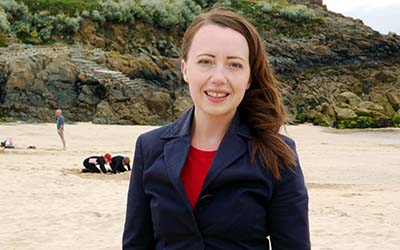You are here
- Home
- Business & Partnerships
- Unions
- Pauline McColgan
Pauline McColgan
 At a time when teachers across Scotland transformed their classrooms into virtual ones in response to the COVID-19 pandemic, Pauline McColgan describes how her studies with The Open University (OU) have helped her to support Educational Institute of Scotland (EIS) members during this challenging time.
At a time when teachers across Scotland transformed their classrooms into virtual ones in response to the COVID-19 pandemic, Pauline McColgan describes how her studies with The Open University (OU) have helped her to support Educational Institute of Scotland (EIS) members during this challenging time.
She explains: “The opportunity to study with the OU arose through Scottish Union Learning (SUL), who recognised the need for project workers to develop their own digital skills in order to support their members to work and learn online during the COVID-19 pandemic.”
The teaching union project worker undertook Online Teaching microcredentials in Creating Courses for Adult Learners, and Accessibility and Inclusive Learning, to help “respond to the professional learning needs of EIS members, as teaching moved quickly online, and learn how to effectively develop and deliver professional learning online”.
“As lifelong learning has been a focus throughout my career, it’s only right to practise what I wish for others,” she adds. “My workplace has also afforded a great deal of support to develop digital skills, for my own benefit, and for those I work with.”
Interactive learning
Online study groups are a great resource of ideas and support. ”
Pauline had previous experience of studying with the OU over a decade ago and has seen a significant progression in online learning provision in that time.
She found that the study format has been “really interactive – the functions and notifications are similar to what we are used to through social media” and she took the opportunity to form weekly online study groups with colleagues.
“This helped maintain some aspect of socialisation you get with face-to-face learning, was a great resource of ideas and support, and helped to talk through how the learning could be applicable in the workplace,” she highlights.
Pauline also welcomed the “continuous, unobtrusive reminders about the course, e.g. on a Monday morning about the topics to be covered that week. This helped in a small way to bring learning into my weekly routine”.
A new digital skill set
My confidence in working online has grown immensely. ”
Looking back over the past year, she comments that “my confidence in working online has grown immensely”, which she attributes to practice and learning about new online tools and resources like Padlet and Unsplash, which she was introduced to during her microcredentials.
Pauline points out: “Two years ago, I would have only used Skype for working online, and that was very occasionally.
“Moving learning online in April 2020 seemed like a huge challenge, and luckily the EIS was supported by learning providers, funders and members to quickly make this happen.
“Participating in courses such as the microcredentials has afforded me a whole new skill set, digital skills, one which I wouldn’t have sought out to develop if there hadn’t been the need to do so, or the funding opportunities.”
“EIS members tell us that what’s beneficial to their professional learning is where they can see the applicability in their own classroom,” she adds.
“The learning offered by the OU microcredentials is of a high quality, with articles, videos and tasks that challenge participants to consider how to apply learning in their own settings.”
Members can benefit from the OU microcredentials by accessing exactly what they need, when they need it.”
“Members can benefit from the OU microcredentials by accessing exactly what they need, when they need it.”
Alongside supporting union members to pivot to online teaching, Pauline highlights how EIS, the OU and SUL worked together to develop a Reflecting on Well-being Activities course “that supported members to reflect on their well-being activities in response to COVID-19, and begin to plan future activities”.
“The course enabled participants to reflect on what had been an incredibly responsive time, where there had been no time to consider what was working and what could be made better.”
Study fitting around your routine
To anyone considering studying with the OU, Pauline says: “I would advise taking time to think about the practicalities, and equally consider the benefits.
“Studying with the OU can fit in around your routine, e.g. reading an article on the morning train commute, or participating in an online learning discussion for an hour instead of watching Netflix.
“If you’re unsure about how you will feel about learning online, or how you will structure your own time, there are a number of very short courses available for free.
“I tried out a couple of these courses first before signing up for a longer course. This helped me understand what would be involved, and also opened up a host of learning I hadn’t realised was available.”
The EIS website has a professional learning area, which includes blogs on key learning from the microcredentials, including practical tools and tips for members to use.